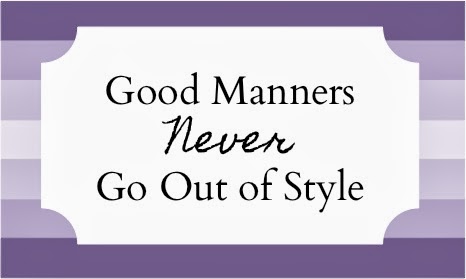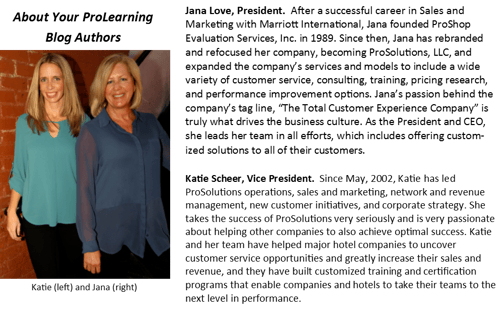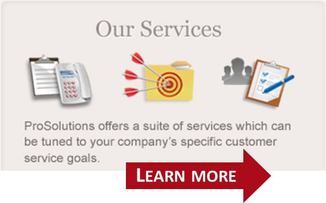 I was raised to care deeply about the lessons my parents instilled in me in regards to manners. They were completely inflexible about my saying "please" and "thank you." It was expected that I would address adults with terms such as "Yes, sir," "Yes, ma'am," and "Mr." and "Mrs." My mother also taught me how to write a proper thank you note, and to this day, I will still write three paragraphs, just like she taught me. So why do I mention all of this? Where have manners gone? In the hospitality industry, one would think manners matter and would get the focus it deserves with people serving people. Yet, still, we are unpleasantly surprised with the poor manners displayed around us in the service industry.
I was raised to care deeply about the lessons my parents instilled in me in regards to manners. They were completely inflexible about my saying "please" and "thank you." It was expected that I would address adults with terms such as "Yes, sir," "Yes, ma'am," and "Mr." and "Mrs." My mother also taught me how to write a proper thank you note, and to this day, I will still write three paragraphs, just like she taught me. So why do I mention all of this? Where have manners gone? In the hospitality industry, one would think manners matter and would get the focus it deserves with people serving people. Yet, still, we are unpleasantly surprised with the poor manners displayed around us in the service industry.
"Manners are a sensitive awareness of the feelings of others. If you have that awareness, you have good manners, no matter what fork you use." Emily Post
We have become complacent with our conversations. There are many overused and over accepted phrases that need to be eliminated from many industries, but especially hospitality. Euan McGlashan says it well, "We take them (phrases) for granted in our everyday conversation, but they are rooted in negative attitudes—attitudes that if left uncorrected can distract us from our goal as hoteliers of creating loyal and happy guests."
The reason that I got on my soap-box regarding manners, or lack thereof, was because I had the pleasure of reading Euan's article in Hotel News Now, called Avoid these 7 phrases for hotelier success. From my perspective, he has hit the best of the worst in the phrases that I cringe when I hear. Here's Euan's list and comments:
- "It is what it is": This phrase has unfortunately evolved from being just words to now becoming a mindset. It rationalizes inefficient performance; it discourages creative problem-solving; and it concedes that a particular problem has defeated us.
- "That's against our policy": Guests don’t know and don’t care what your policies are; they want a solution—and they deserve satisfaction.
- "No problem" or "No worries": Actually, there IS a problem and the guest IS worried; that’s why he or she has come to you. Perhaps you think you are being reassuring, but you are actually minimizing the guest’s concerns.
- "To be honest" or "honestly": People use these words to build trust and closeness when emphasizing a particular point. However, this language actually creates distance because it raises a red flag by making listeners wonder if you have been telling the truth in other statements.
- "Whatever": This word typically conveys indifference and apathy with its meaning of “whatever you say” or “I don’t care what you say.” The word is always annoying, impolite, and offensive. Avoid it. Period.
- "For sure": We often use this phrase to agree with someone, but it is a much too casual and informal way to speak with guests. When you mean “yes” or “certainly” or “definitely,” then just say so.
- "My bad": This phrase says, “I made a mistake, but I don’t care and I’m not apologizing.”You’re telling the listener to get over the problem and move on. It’s a statement and an attitude that are flippant, rude and unacceptable in hospitality.
If your organization is using any of these 7 phrases with your guests, you are knocking at the door of creating an unpleasant guest experience. Put focus on eliminating the use of these with your team. When you hear one, when timing is appropriate, tell your employee a better way to phrase what they said. Evaluating employees' performances is what we do. We not only find what needs improvement, but our evaluations are turn key; we tell them the "how-to" for improving. These subtle 2 or 3 word phases are dangerous to your image. Be inflexible when it comes to using proper manners, like my parents...



